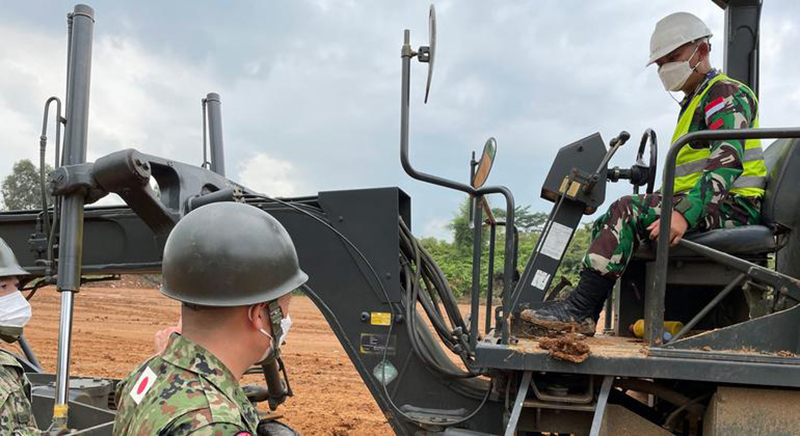 Central African Republic
Central African Republic
Peacekeepers turn ground-breakers in the Central African Republic
New York: Handling heavy machinery is not one of the first skills that comes to mind when we think of UN peacekeepers, but construction skills are an important component of the blue helmets’ competency toolkit.
Operating an excavator, a bulldozer or a wheel loader did not come naturally to Chief Private Ryan Herdhika, an avid motorcyclist and soldier in the Indonesian Army’s 3rd Combat Engineering Battalion. But he has just passed his heavy engineering equipment test and will next month be deployed to the United Nations Multidimensional Integrated Stabilization Mission in the Central African Republic (MINUSCA) as part of the Indonesian peacekeeping force there.
“It will be the first time in my life I will go abroad, and I am proud that my first trip is as a UN peacekeeper, not a tourist,” said Chief Private Herdhika, while getting on a motor grader to practice how to level the ground in a training field in Sentul, at the Indonesian military’s vast peacekeeping centre.
With close to 2,700 soldiers on active duty in seven UN peace missions, Indonesia is the eighth largest contributor to global peacekeeping operations.
Solid foundations for a fragile peace process
Under the UN’s Triangular Partnership Programme (TPP) – which brings together countries that provide trainers and resources, and troop contributing countries that deploy to peacekeeping missions – military engineers with extensive experience in operating heavy engineering equipment in peacekeeping missions from the Japan Ground Self-Defense Force (JGSDF) trained 20 Indonesian soldiers.
The personnel of the Indonesian Armed Forces who completed the training will use their skills to help build and repair UN mission and host country infrastructure including supply routes and camp grounds, and support national recovery efforts following natural disasters in the Central African Republic. MINUSCA has been present in the country since 2014, with a mandate to protect civilians and support the fragile peace process and the transitional government.
“This is a very hard course, having to learn to use a diverse set of equipment in just nine weeks,” said Lieutenant Colonel Tsuyoshi Toyoda, Commander of the JGSDF Training Team. “The trainees worked hard, passed the test and are ready to deploy.”
While there are commercial instructors available to teach these skills in a civilian setting, the complexities of UN peacekeeping operations require trainers with peacekeeping experience.
“In a normal construction site, operators specialize in a single kind of equipment, but here we need the soldiers to learn and operate six types of machines,” said Colonel Herman Harnas, Director of International Cooperation at the Indonesian Armed Forces Peacekeeping Centre. “In a peacekeeping situation, you also do not have the luxury to have separate staff for maintaining the vehicles – so the soldiers need to learn that as well.”
This is the first time such a training course is taking place in Indonesia, though similar courses have been held in Brazil, Kenya, Morocco, Rwanda, Uganda and Viet Nam, countries that are also important contributors to the UN’s peacekeeping efforts.
Enhancing the preparedness and effectiveness of peacekeeping missions is at the core of the TPP’s raison d’être. But the work of a peacekeeping engineer serving in UN missions requires more than specialized technical knowledge, and the TPP reflects the harsh reality of the peacekeeping environment.
“Our soldiers also learn discipline and the importance of following protocols, which is particularly key in emergency situations, when they need to act quickly,” says Colonel Harnas. “The soldiers are now able to deploy to MINUSCA, one of the UN’s most complex peace operations.”
A particular set of skills
The UN is committed to continue strengthening engineering, medical and technological capacities of uniformed peacekeepers, says Rick Martin, Director of Special Activities at the UN’s Department of Operational Support in New York.
“As we face new operational challenges within UN peacekeeping operations, high-quality enabling units in engineering and other key capability areas will need to continue to be a priority area if we are to close capability gaps and improve the performance of UN peacekeeping operations,” he adds.
Next year, the UN and Japanese trainers will be back in Sentul to hold a training-of-trainers course, this time teaching future equipment instructors from armies from across the region who contribute to peacekeeping. By then, Chief Private Herdhika will be operating engineering equipment in the Central African Republic. “But after I come back, I hope to be able to pass on my knowledge and experience to my future peacekeepers colleagues as well,” he says.
Support Our Journalism
We cannot do without you.. your contribution supports unbiased journalism
IBNS is not driven by any ism- not wokeism, not racism, not skewed secularism, not hyper right-wing or left liberal ideals, nor by any hardline religious beliefs or hyper nationalism. We want to serve you good old objective news, as they are. We do not judge or preach. We let people decide for themselves. We only try to present factual and well-sourced news.







